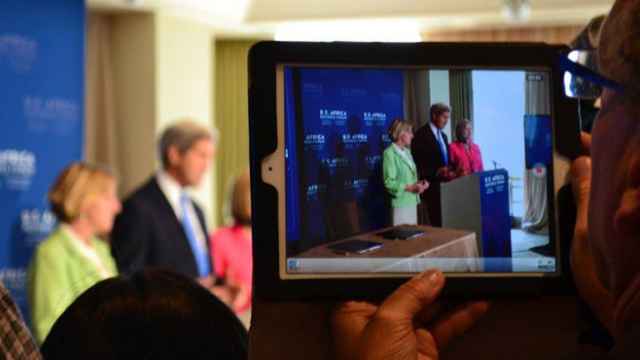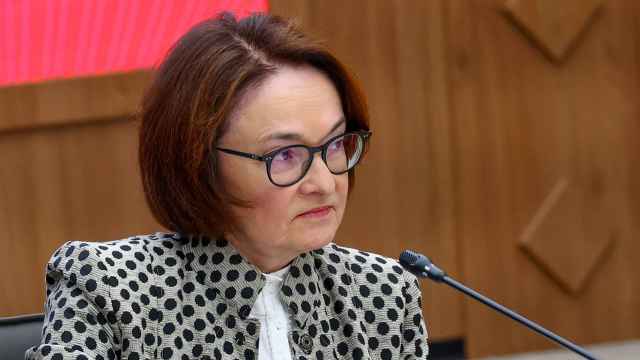The annual "Russia Calling" investment conference kicks off this week in Moscow with investment bankers in no mood to talk.
Western sanctions have killed off any hope of a revival in takeovers, stock market debuts and international sales of stocks and bonds this year and some banks are firing staff and reshuffling roles to keep costs down.
"For investment banks, as for most other businesses in Russia, this winter will be all about surviving on low volumes," said Chris Weafer, founding partner at Macro Advisory, a Russia-focused consultancy.
"The damage already inflicted by existing sanctions, even if they start to be eased in November, means that normal investment activities are dead until at least mid next year."
For Russia's state-controlled investment banks, VTB Capital , Sberbank CIB and Gazprombank, the situation is particularly acute.
Frozen out of Western capital markets due to Russia's perceived support for separatist rebels in Ukraine, the sanctioned lenders have dropped down the local investment banking league tables as deals dry up and some customers steer clear of doing business with them.
VTB Capital, Russia's largest homegrown investment bank, has lost its top spot in the rankings for the first time since 2010, falling to No 3 so far this year as its fee income slid 45 percent, according to data compiled by Thomson Reuters/ Freeman Consulting.
VTB Capital has ranked either first or second since 2009, the year after it was founded by Russia's second-largest banking group, VTB Group.
VTB Group's net profit fell 82 pct in the first half due to Russia's economic slowdown and tensions over the crisis in Ukraine, it does not strip out the performance of VTB Capital.
Sberbank's investment division has fallen five levels to rank No 7 on the back of a 46 percent drop in fee income. Gazprombank has stayed level at No 5 so far this year, despite seeing its fees fall by over a fifth.
Overall, Russian investment banking fee income has halved to $236 million so far this year, according to the data.
Against such a backdrop, VTB Capital's annual "Russia Calling" investment forum, featuring a guest appearance from President Vladimir Putin, will be held on Wednesday and Thursday. In previous years, it was a three-day conference. There are no plans to repeat last year's sister events in New York and London.
Dominant at home, VTB Capital has had mixed success overseas and even before it was blacklisted by the West it had started to rein in its global ambitions, cutting and relocating some staff this year in New York and London.
The bank's international chief executive Atanas Bostandjiev left in July. The bank said this month that it did not plan further job cuts beyond what had already been announced.
"VTB Capital does not plan to decrease the volume of its trading operations in its international offices," a spokeswoman said.
Still Work Around
While some banks, such as JP Morgan and Bank of America Merrill Lynch, have cut some Russia-focused staff, according to sources, major job cuts or restructurings have not yet happened.
Keenly aware that it is hard to rebuild in a country where having political goodwill is crucial, many foreign lenders are instead waiting to see if a fragile cease-fire in Ukraine takes hold, opening the way for a possible easing of sanctions.
"M&A is largely on hold. With the exception of pharma and consumer, no one is even speaking to each other. Private equity has totally stopped," said a Moscow-based investment banker working for a foreign bank.
Even if tensions ebb in Ukraine, many bankers are doubtful that growth and investment will snap back quickly. The Ukrainan crisis brought Russian relations with the west to their lowest point since the Cold War and foreign investors will be wary of rushing back in.
Russia's former Finance Minister Alexei Kudrin said last week that Russia may only be able to borrow again on global financial markets in several years' time, even if Western sanctions over the Ukraine crisis weren't intensified further.
With the United States ratcheting up the penalties for breaching sanctions, fining BNP Paribas a record $9 billion earlier this year, banks are anxious not to fall foul of the Russian restrictions.
But with some Russian companies shunning their sanctioned local investment banks, some foreign lenders in the country have seen a jump in business albeit from a low base.
Each deal and sale has to be scrutinized by banks' compliance departments.
"Everything we are doing at the moment has to go up to our reputation committee to be reviewed, (but) there are lots of deals you can do that are legal so you can still do quite a lot," said one senior executive with a European investment bank.
Citi is now the top ranking investment bank in Russia after an 81 percent jump in fee income in the year to date propelled it from 6th place a year ago, according to the data compiled by Thomson Reuters/Freeman Consulting.
Deutsche Bank and Credit Suisse are now ranked second and fourth respectively after their fee income jumped 350 percent and 245 percent.
A second person working for a global investment bank in Moscow said colleagues were making the best of the lean times, hopeful that their bank's strong revenues from outside Russia would keep the local division afloat.
"There is noticeably less work, but on the other hand people have got the chance to improve their health," he said. "People have started playing sport with all their might."
A Message from The Moscow Times:
Dear readers,
We are facing unprecedented challenges. Russia's Prosecutor General's Office has designated The Moscow Times as an "undesirable" organization, criminalizing our work and putting our staff at risk of prosecution. This follows our earlier unjust labeling as a "foreign agent."
These actions are direct attempts to silence independent journalism in Russia. The authorities claim our work "discredits the decisions of the Russian leadership." We see things differently: we strive to provide accurate, unbiased reporting on Russia.
We, the journalists of The Moscow Times, refuse to be silenced. But to continue our work, we need your help.
Your support, no matter how small, makes a world of difference. If you can, please support us monthly starting from just $2. It's quick to set up, and every contribution makes a significant impact.
By supporting The Moscow Times, you're defending open, independent journalism in the face of repression. Thank you for standing with us.
Remind me later.





